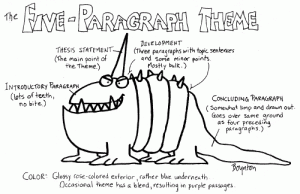 Lots of you are afraid of Paper 1. You fear the moment that you open the exam and discover that you have to have an opinion. Your opinion. Not your teachers or the revision course booklet’s or your parent’s. Your own. It’s just you, a blank page, a biro and the light of your imagination. So I ask myself what are you so afraid of?
Lots of you are afraid of Paper 1. You fear the moment that you open the exam and discover that you have to have an opinion. Your opinion. Not your teachers or the revision course booklet’s or your parent’s. Your own. It’s just you, a blank page, a biro and the light of your imagination. So I ask myself what are you so afraid of?
And to be fair I remember this fear myself, the desire to do well balanced against the uncertainty of not knowing what I would face on the day. But I don’t recall the same level of anxiety that I see on a daily basis in my classroom. I don’t recall complaining about how unfair it all was (maybe that’s just because I was lucky enough to love English) Or asking ‘How could the examiners expect us to make it up on the spot?’ as though thinking on your feet were somehow a ludicrous proposition. I do remember being infuriatingly opinionated about pretty much everything – I still am – but I also thought it was part and parcel of being a teenager. Stick it to the man. Tell it like it really is. Perhaps I was just naive.
So let’s try to get to the bottom of it. What has happened in our education system to make you so afraid?
Well first of all, education is increasingly a business with you as the client and us as the provider. Because of the demands students and parents make on teachers and because teachers make those demands of themselves – let’s face it, we all want you to get good results – you are being spoon fed. You are being told what to learn but all too often you are not being taught how to learn. And you are not innocent in this process so don’t fool yourself – you tell the teacher, I want notes. I need notes. At home you condition your parents to think that the more notes you get the better the teacher is. Even the teachers start to believe this. When you get a corrected test or a piece of homework back all too often (and of course there are plenty of exceptions) your message to us is ‘I don’t care what I did wrong. I don’t need to think about that. I just need you to fix it so that when I’m rote learning it off for the exam I’m not learning something with mistakes in it’.
But the mistakes inevitably appear in the exam because you have to demonstrate that you understand what you’re talking about.
Or maybe not. Maybe few mistakes appear because this is, after all, the Leaving Cert & it caters all too well to rote learning.
Maybe it’s only when you go to college that the wheels fall off the wagon because now you are expected to think for yourself, to figure it out, to have an opinion. To go to the library and wade through reams of information because no-one around here is going to hand you a neatly photocopied summary of the topic, you have to come up with that yourself. But nobody’s ever asked that of you before and you don’t know how. You HATE having to have an opinion of your own, because there are no guarantees that it’s RIGHT. And you want guarantees. And notes. And predictable exams. And good grades. And a good job afterwards, thank you very much. You can always ask someone in the year ahead for their notes. For a price of course. Education is still a business after all.
But then the wagon falls apart completely when you start working because suddenly someone else is the client and YOU are the provider. Your boss wants you to write a memo, make a presentation, compile a report. Hell, even before you get to that stage you need to write a letter of application to get the job. You vaguely remember your teacher trying to get you to do this when you were at the peak of your teenage hormonal obsession with that boy with the nice skin and the broad shoulders who smelled like a Lynx ad. You were probably in 2nd yr. But then exams kicked in and then more exams kicked in and eventually you decided it was easier to give your voice away to someone else. You became a kind of talking puppet for other people’s notes and opinions – all of which you were able to learn off verbatim because you’re good at that – but you lost yourself. You lost your own voice.
Not every student feels like this. Lots of you have a wonderful voice on paper that you trust, that you feel confident in unleashing on the world. But even you are still filled with doubt, with uncertainty because there is no predicting what will come up on the day. You have to prove that you know what you’re doing. Pick the right words, use the right techniques, choose the right format. And for some of you, for many of you, this is terrifying. It’s like entering a burning building with no insurance.
I want none of you to feel like this. I’d like you to trust your voice. Have an opinion. If there are all sorts of topics out there that you don’t have an opinion on, there’s plenty of time to read more about them, to form an opinion. Don’t be afraid to speak your mind. I will not ridicule you – when have I ever done that? I might make suggestions about how to edit your work, how to make it better. And that isn’t a threat to your voice. That is professional help to clarify your thoughts and words and ideas. But your voice is still your own and you need to own it. Because one day you will be asked for your opinion – at work, or when you are raising your children, or when you are caring for your elderly parents. And I don’t want you to feel the same panic then that you feel now when I ask you to write a speech or an article or a personal essay or a short story. I know you feel uncertainty. But you always have your voice. And no-one can take that away from you.
Except if, like me, you’ re suffering from chronic laryngitis.
ps
Let me repeat – the system stinks. That’s not your fault.
It’s natural to feel anxiety about Paper 1 – especially if English isn’t one of your better subjects and you have no aspirations to be a writer. Ever. It’s the equivalent of asking me to be enthusiastic about maths -wasn’t my strongest subject at school and you’ll never make me enthusiastic about it.
So it’s ok to be nervous. And it’s not your fault the system is so flawed. But we’ve got plenty of time between now and then for you to gain some of the confidence you need for Paper 1. Can we do it? Yes we can.
 When you brainstorm you’ll often just have individual words written down but if you want to turn a word into a paragraph of prose how do you do it?
When you brainstorm you’ll often just have individual words written down but if you want to turn a word into a paragraph of prose how do you do it?






